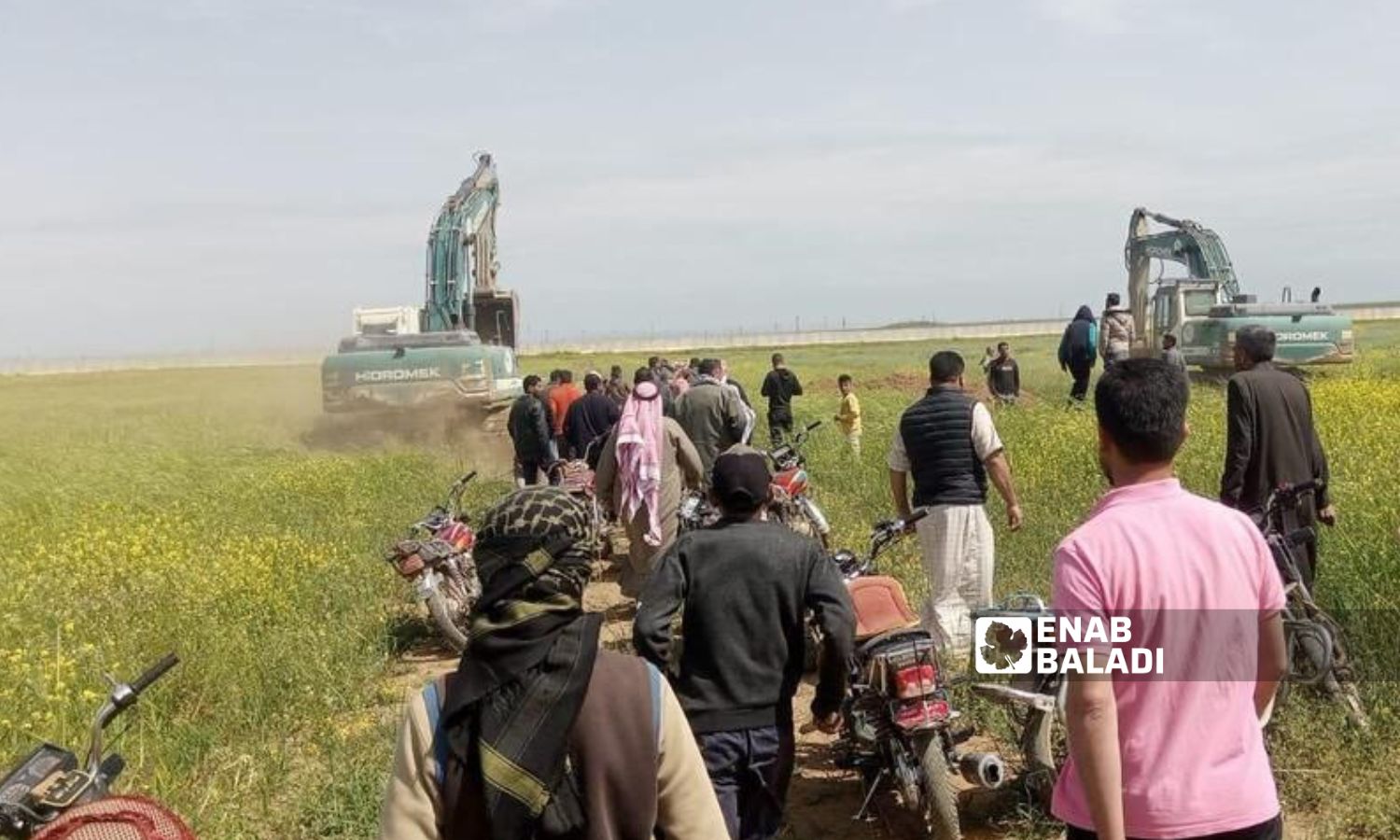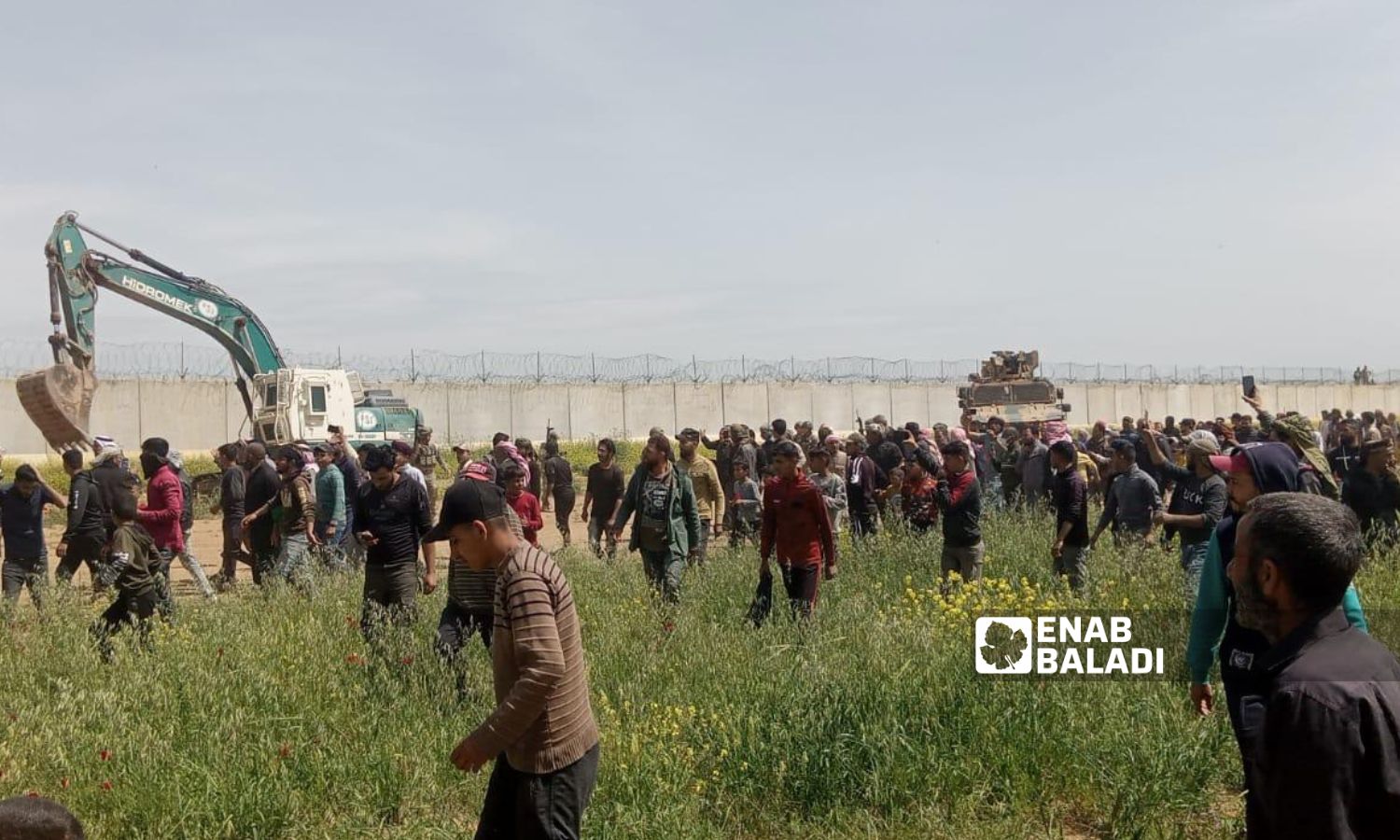



Enab Baladi – Ras al-Ain
With the start of the harvest season a few days ago, the farmers of Tal Abyad and Ras al-Ain in northeastern Syria faced troubles represented by the decrease in the purchase price of wheat, and the imposition of a $10 tax on each grain ton by armed factions and local councils, preceded a month earlier by digging a military trench on the Syrian-Turkish border.
Public dissatisfaction and protests prevailed in the wake of these problems. Local councils canceled the tax, and the Ministry of Defense in the Turkey-backed Syrian Interim Government (SIG) published a statement stating that there is no faction that imposes “royalties,” while farmers received promises of financial compensation in the case of excavations within their land.
In the area under the control of the Interim Government, responsibilities overlap between it and the local councils that manage each area. The Interim Government refused to set any fees, while each local council imposed different fees under the name of “agricultural origin certificate fee,” which was then abolished.
Farmers in Tal Abyad and Ras al-Ain complained about the imposition of “royalties and taxes” by military factions and local councils and about the low price of buying wheat from them, as the Interim Government set the price of a ton of pure first-grade durum wheat at $330, while it set the price of a ton of soft wheat at $285 per net ton.
The agricultural origin fee is imposed on the agricultural product when it is sold, and its value is determined based on the decisions of the local councils or the concerned authorities.
Yasser al-Zaid told Enab Baladi that the imposition of the origin fee causes a great impact on farmers in Ras al-Ain, and increases the pressure and burden on them, especially after the issuance of the wheat price by the Interim Government, which is not commensurate with the costs.
Al-Zaid added that the origin fee increases production costs and negatively affects financial returns, pointing out that the specified wheat price does not reflect the economic reality and agricultural requirements.
The farmer pointed out the importance of reviewing the policies of imposing fees of origin and wheat pricing, the need to provide protection for farmers and to encourage investment in the agricultural sector in order to maintain its sustainability and achieve the well-being of farmers and the development of the rural community.
Farmers in the area told Enab Baladi that the Ahrar al-Sharqiya, a key unit of the Syrian National Army (SNA), owns two military checkpoints on the road to Ras al-Ain at the villages of Muhaisin and Rajm, and the farmer who owns the crop cannot pass without paying money.
For his part, media activist Mahmoud al-Omar told Enab Baladi that the living situation in the region was negatively affected due to the results of the “negative administration,” as it affected the agricultural sector in particular, which is considered the vital artery in the region.
The activist pointed out the need to strengthen cooperation between the local councils and the Interim Government to support all sectors in the region, especially agriculture, which plays a crucial role in providing food, enhancing food security, and providing job opportunities for local farmers.

Farmers protest against the digging of a military trench within their land in the countryside of Ras al-Ain, northeastern Syria – April 18, 2023 (Enab Baladi/Hussein Shaabo)
On June 17, the Interim Government’s Ministry of Defense said that it rejects any transgressions regarding the imposition of taxes or fees by the military formations on the agricultural crops of the people and residents in Ras al-Ain in the countryside of al-Hasakah and Tal Abyad in the countryside of Raqqa.
In this regard, it stated that it had issued instructions to the Military Police Department to prevent any abuses and to respond promptly to any complaints submitted by farmers in the region.
On June 13, the local council of Tal Abyad declared that the certificate of agricultural origin fee is not required, and on the 18th of the same month, the local council in Ras al-Ain issued a similar decision waiving the origin fee.
The Liberation and Construction Movement published a statement on June 12 denying imposing taxes on farmers.
The SNA faction stated that it directed its forces to facilitate and assist farmers during the process of harvesting grain and to protect crop collection points. It also sets a contact number to receive and respond to any complaint.
The director of the Agriculture Office in the local council of the city of Tal Abyad, Ayoub al-Hamidi, told Enab Baladi that the council approved the cancellation of the certificate of origin fee for farmers after a request from the Grain Corporation of the Interim Government.
In a similar situation in Ras al-Ain, Omar Hammoud, head of the agricultural office, told Enab Baladi that the office is committed to providing the best services to farmers and working to strengthen the agricultural sector in the region and achieve the well-being of farmers, and to develop policies that enhance the ability of farmers to fully benefit from the office’s services and obtain the necessary support.
Expectations of wheat production in the cities of Tal Abyad and Ras al-Ain range between 200,000 and 250,000 tons, and in the northern and eastern countryside of Aleppo, it reaches 40,000 tons, according to Abdel Hakim al-Masri, the Interim Government’s Economy Minister.
On April 13, the Interim Government’s Ministry of Defense issued a circular establishing a “prohibited” military zone with a depth of 300 meters in the cities of Tal Abyad and Ras al-Ain.
About a week after the decision, vehicles, and members of the Turkish forces began digging a trench adjacent to the Syrian-Turkish border in private lands owned by farmers, 300 meters away from the border.
The excavation process led to widespread protests by the people, rejecting the decision and denouncing the expropriation of areas of their land, which is their source of livelihood in an area where most of its residents depend on agriculture.
The ministry did not mention the establishment of a trench within the private lands of the farmers, nor did it mention that the area is adjacent to the Turkish border, and said that it starts from the line of contact with the Syrian Democratic Forces (SDF) and along all the countryside along the border in the cities of Tal Abyad and Ras al-Ain in the Turkish-controlled Peace Spring region.
Mahmoud al-Ashaer, one of those affected by the digging of the trench, told Enab Baladi that this measure poses a great threat to his livelihood and the livelihoods of most of the farmers in the lands affected by the digging operations.
The farmer expressed his concern about the impact of the trench on agricultural production and the expected financial returns from his crop.
He said that the framers met with the local council and the concerned security institutions with the aim of discussing the issue and finding solutions to the problem.
In these meetings, the local council in Ras al-Ain provided reassurances to the affected farmers and confirmed its readiness to compensate all those affected by digging the trench.
Sheikh Salem Salih al-Samir, head of the Civil Peace and Reconciliation Department in the Syrian Council of Tribes and Clans in the city of Ras al-Ain, told Enab Baladi that the complaints of the people and farmers regarding the impact of digging the trench on the lands have been responded to.
After the council communicated with the concerned authorities and the region’s governor, a meeting took place, and a decision was taken to reduce the permissible distance for digging trenches from 300 meters to 20 meters and to obtain promises from the concerned authorities to compensate the affected farmers by offering annual compensation, according to al-Samir.
A specialized committee was formed to conduct a census of the damaged lands, and this committee is responsible for assessing the damages and determining compensation.
The commander of the military police in Ras al-Ain, Lieutenant Colonel Mahmoud Hamza, told Enab Baladi that after consulting with those concerned and the people, a trench was dug with a width of no more than 20 meters, and this decision was taken with the aim of preserving the security of the area and protecting the people from the threats of smugglers, drug dealers, and gangs.
Hamza considered that this measure is part of the security efforts to reduce criminal activities, maintain public order, strengthen security control, and improve control over border areas and sensitive areas by setting clear geographical boundaries.
The Turkish-backed SNA took control of Ras al-Ain region, northwest of al-Hasakah, and the city of Tal Abyad, north of Raqqa, after the battle of Operation Peace Spring, launched by Turkey in October 2019 against the SDF.
Enab Baladi’s correspondent in Ras al-Ain, Hussein Shaabo, contributed to this report.
if you think the article contain wrong information or you have additional details Send Correction